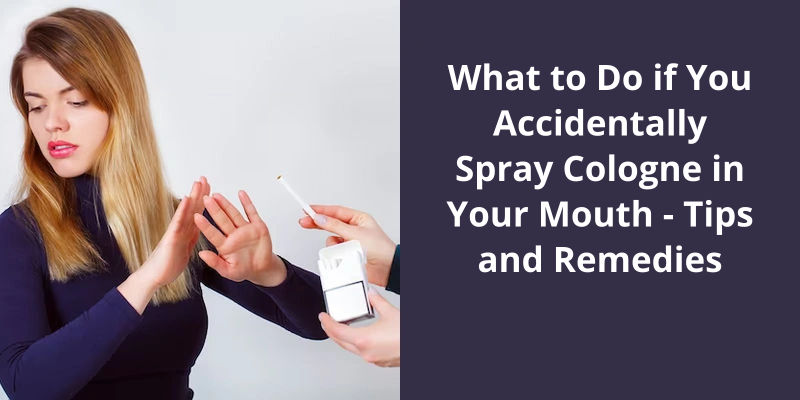Whether your perfume is too strong or not can depend on a number of factors. If you can continuously smell the fragrance throughout the day, it’s likely too strong. Similarly, if others comment on the strength of your perfume or you’re leaving a scent trail behind you, this might indicate your perfume is overpowering. To maintain a balance, apply less perfume or opt for a lighter, subtler scent. Remember, your perfume is for your personal enjoyment and a hint of scent for those close to you, rather than a dominant force in the room.

What Happens if You Put Too Much Perfume?
One of the most common risks associated with using too much perfume is skin irritation. Some people may experience itching, redness, or inflammation when they apply too much fragrance to their skin. This is particularly true for people with sensitive skin or those prone to skin conditions like eczema or psoriasis. In some cases, excessive use of perfume or cologne can even lead to contact dermatitis, a condition characterized by rashes, blisters, and other painful symptoms.
Some people may experience asthma-like symptoms, such as wheezing, coughing, or shortness of breath, when exposed to high levels of fragrance chemicals. This is especially true for people who work in fragrance-intensive environments, such as beauty salons, spas, or department stores.
Finally, using too much perfume or cologne can also be a social problem. Some people may find it rude or offensive if they’re exposed to strong fragrances in public spaces, such as elevators, buses, or movie theaters. This can lead to social ostracism, which can have negative effects on your personal relationships and your overall sense of well-being.
Overall, while using perfume or cologne can be a great way to express your personal style and enhance your mood, it’s important to use these products in moderation. If you find yourself experiencing any negative side effects from using fragrance products, such as skin irritation, respiratory problems, or emotional distress, it may be time to reconsider your usage habits. By being mindful of how much perfume or cologne you use, and how sensitive those around you may be to fragrance chemicals, you can enjoy the benefits of these products without putting your health or your relationships at risk.
When it comes to wearing perfume or cologne, many people want to make sure that the scent lasts throughout the day. However, if you can constantly smell the fragrance on yourself, it may actually mean that you’ve used too much. In this article, we will explore why it’s important to use perfume in moderation and offer tips on how to apply it properly for the best results.
What Does It Mean if You Can Smell Your Own Perfume?
The sense of smell plays a crucial role in our daily lives. It helps us to appreciate the fragrance of flowers, enjoy the aroma of baked goods, and to detect the presence of danger, such as smoke. However, when it comes to perfume, the level at which we perceive the scent can be quite subjective. Some people may complain that a fragrance is overwhelming, while others might not even be able to detect it.
If you find yourself constantly smelling your own perfume throughout the day, it could be an indication that you’ve over-applied it. You might have sprayed too much in one area or sprayed too many times in general. This can cause the scent to be too strong and overpowering, not only to yourself but also to those around you. In addition, it can be a waste of precious perfume, as it may evaporate quickly without fully developing it’s scent.
It’s important to keep in mind that just because you cant smell your own perfume, it doesn’t mean that others cant. Our noses can become desensitized to certain scents over time, especially if we’re exposed to them frequently. This is known as olfactory adaptation.
To avoid over-applying your perfume, try to limit your sprays to just a couple of spritzes. Focus on applying the perfume to pulse points, such as the wrists, neck, and behind the ears. This will help to ensure that the scent isn’t too strong and that you won’t need to keep smelling yourself throughout the day. Additionally, you can consider applying fragrance-free lotion or oil to these areas before spraying with perfume, as this can help to make the scent last longer without having to reapply as often.
In general, it’s important to remember that less is more when it comes to perfume. Using too much can have a negative impact on those around you, as well as on the scent itself. So, the next time you apply your favorite fragrance, be sure to do so in moderation and enjoy the subtle nuances of the scent without overwhelming yourself or others.
Now that we know about the different notes in perfume, it’s important to understand how to determine if a fragrance works for you. It can be difficult to judge the scent based on initial application alone, as the fragrance will continue to evolve as it interacts with your skin and body chemistry. Read on to discover some tips for accurately assessing whether a perfume smells good on you.
How Do I Know if a Perfume Smells Good on Me?
The middle notes appear after the top notes have evaporated and are often referred to as the heart of the fragrance. These notes determine the overall character of the perfume and can last for several hours. The base notes are the heaviest and emerge after the middle notes have dissipated.
It’s important to give the perfume time to absorb into your skin before making a decision. This allows for the notes to fully develop and for your body chemistry to interact with the fragrance. It’s also recommended to avoid testing too many fragrances in one day as this can overload your senses and make it difficult to distinguish between scents.
Another way to test if a perfume smells good on you is to try it on your pulse points. These areas include the wrists, behind the ears, and the neck. The warmth of these areas helps to activate the fragrance and provides a more accurate representation of how it will smell on you.
When trying a new perfume, it’s also important to consider the occasion and environment in which you’ll be wearing it. Some scents may be more appropriate for daytime or evening wear, while others may be better suited for specific seasons or events.
Ultimately, the best way to know if a perfume smells good on you is to trust your instincts and personal preferences. Fragrance is subjective and what may smell good on one person may not work for another. It’s important to find a scent that makes you feel confident and comfortable wearing it.
How to Choose a Perfume Based on Your Personality and Style.
This article will guide you on how to select a perfume that suits your personality and style.
Now that we’ve discussed the types of scents that work best for different skin types, let’s talk about some other factors to consider when choosing a perfume. While fragrance preference is subjective, there are certain guidelines that can help you select a scent that will work well with your skin’s chemistry and make you feel confident and alluring. From understanding fragrance families to considering the occasion, there are many things to keep in mind when selecting a perfume that’s right for you.
How Do I Choose a Perfume for My Skin?
When looking for the perfect perfume for your skin, there are a few things that should be taken into consideration. The first and foremost is your skin type. If you’ve oily skin, youll want to choose a lighter, more floral or citrus scent as these won’t overpower your natural scent. Additionally, these scents tend to be more refreshing and revitalizing, which is perfect for the summer months. On the other hand, if you’ve dry or dehydrated skin, heavier fragrances with stronger scents may be more suitable.
Another factor to consider when choosing a perfume is the occasion youre wearing it for. Different types of fragrances are more appropriate for different situations. It’s also important to keep in mind the environment youll be in, as certain scents can be overpowering in enclosed spaces.
When testing perfumes, it’s always best to try them on your skin rather than just smelling them from the bottle. This will give you a better idea of how the fragrance will interact with your skin chemistry and how long it will last. Furthermore, it’s important to wait a few minutes after applying the perfume to allow the scent to mature and develop, as many fragrances can change over time.
With a little bit of knowledge and experimentation, youll be able to find the perfect scent that not only suits your personality, but also compliments your natural beauty. So go ahead and try on a few different fragrances – you might just discover a new signature scent!
Tips for Storing Perfume to Keep Them Fresher for Longer
- Keep perfume bottles out of direct sunlight and away from heat sources such as radiators and electrical devices.
- Store perfumes in cool, dark places like drawers or cabinets.
- Keep the perfume bottles tightly closed to prevent air from getting inside.
- Avoid storing perfumes in humid areas like bathrooms since humidity can affect the fragrance.
- Consider using a perfume tray or stand to display your bottles, while also keeping them protected.
Reducing the strength of perfume can be a tricky task, especially when you accidentally apply too much. However, with a simple solution involving rubbing alcohol and cotton balls, it’s easier than you might expect. By removing a percentage of the fragrance essential oils through gentle dabbing, you can achieve a lighter scent that won’t overwhelm those around you.
How Do You Reduce the Strength of Perfume?
This method works particularly well for people with sensitive skin or those who find that their perfume is too overpowering.
Another way to reduce the strength of your perfume is to mix it with an unscented lotion or oil. This will help to dilute the fragrance oils and make it less intense. Be sure to use an unscented product so that you don’t change the character of the scent.
Simply apply a drop or two of vinegar to the same area where you applied your fragrance. The vinegar will work to neutralize some of the fragrance oils.
This is because the fragrance oils have less to cling onto when applied to clean, scentless skin.
If you find that your perfume is simply too strong for your tastes, consider switching to a lighter or more delicate fragrance. Many fragrance brands offer a variety of scents that range from light and airy to bold and powerful. By choosing a scent that’s better suited to your preferences, you may find that it’s easier to wear and enjoy without feeling overwhelmed.
Source: How to adjust the strength of your fragrance – Scent Lodge
Conclusion
In summary, while it can be tempting to douse yourself in your favorite perfume, it's important to remember that less is often more. Over-application can’t only be overwhelming for those around you, but it can also interfere with the scent's intended subtleties and nuances. To strike the perfect balance, consider applying your fragrance strategically, such as on pulse points or in areas where your body temperature is higher. By doing so, you can ensure that your scent remains distinctive and alluring without overwhelming those in your vicinity. Ultimately, remember that fragrances are meant to enhance your natural aroma, not overpower it, so exercise a bit of restraint and enjoy the delightful scents that life has to offer.





